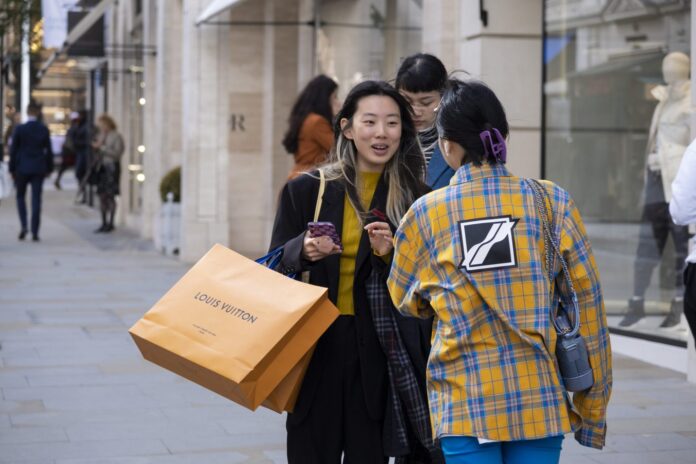Not anything gold can keep. In spite of years of strong performance, the marketplace for private luxurious items is ready to decelerate this 12 months for the primary time for the reason that 2009 Nice Recession. Now, 50 million luxurious customers have both ditched purchasing clothier luggage, scarves, watches, and extra—or had been priced out, Bain & Corporate’s new annual luxury report warns.
Just a 3rd of luxurious manufacturers will finish the 12 months with sure expansion, Bain posited, down from two-thirds ultimate 12 months.
Having a look forward, it mentioned that to stick alive, manufacturers want to reevaluate their worth proposition—basically for Gen Zers—and stay assembly their rising expectancies.
As for a way? Marie Driscoll, an fairness analyst concerned about luxurious retail, instructed Fortune that reinvention is essential.
“Get again to books, make merchandise extra inspirational, make the buying groceries revel in marvelous,” Driscoll mentioned. “You want to continuously meet customers at a special approach and marvel and enjoyment them.”
“A marvelous ice cream sundae is uninteresting by the point you’ve it the 5th time,” Driscoll added.
Damaged guarantees to consumers
On some stage, manufacturers have damaged their guarantees to customers, Driscoll mentioned.
“Since 2019, there’s been a excessive value building up throughout luxurious and not using a corresponding building up in innovation, carrier, high quality, or enchantment {that a} luxurious model will have to supply,” Driscoll added. “This 12 months, that truly hit customers, and we felt the total affect.”
It possibly explains why the posh powerhouses, together with LVMH (which owns Dior and Louis Vuitton), Burberry, and Kering (proprietor of YSL and Gucci), neglected earnings goals this 12 months. Actually, LVMH used to be dethroned as Europe’s Most worthy corporate in September 2023 through Novo Nordisk, the maker of Ozempic.
Consumers—past being hamstrung through eye-popping costs with which their salaries hardly stay tempo—are most probably rising unimpressed through the goods those high-end manufacturers have to provide.
Some greater than others. Michael Kors, founding father of his namesake model, mentioned all the way through New York Style Week in September that he’s suffering with “model fatigue” in an effort to provide an explanation for 14% year-over-year earnings drops, pointing his finger at speedy type and social media influencers maintaining with traits a lot, a lot sooner.
“The luxurious shopper needs one thing this is uncommon, distinctive, bespoke, gorgeous and in particular theirs,” Hitha Herzog, a retail analyst, instructed Fortune. “Whilst some luxurious manufacturers be offering fundamental customization, nearly all luxurious manufacturers haven’t any solution to make one-off items for his or her VIP purchasers, or create one thing so aspirational shoppers can attempt to ultimately personal.”
One main exception: Hermés, which has skyrocketed in expansion this 12 months whilst its business friends have struggled. Herzog mentioned that is in large part due to its Birkin bag, which amasses “lengthy waitlists and necessities and benchmarks of what quantity of money a buyer spends sooner than they are able to communicate to the shop about buying a bag.” That exclusivity, Herzog mentioned, “creates a mystique round proudly owning one thing uncommon, and offers it a way of price while you have a look at the cost tag.”
The China impact
China were propelling luxurious expansion since 2000 the entire method till the pandemic. “Luxurious expansion globally benefited from the expansion of the Chinese language center elegance, the aspirational elegance, and the folks that turned into millionaires,” Driscoll mentioned.
LVMH, a bellwether for the bigger luxurious house, posted a 3% revenue drop ultimate month, due largely to the continuing affects of inflation on shopper habits—particularly within the a very powerful Chinese language marketplace. For its section, Kering reported a fifteen% year-over-year decline ultimate month.
Bain mentioned the pointy lower in spending in China is because of “lackluster shopper self belief”—they usually’re no longer by myself.
Globally, the present financial surroundings has made many “aspirational” consumers extra conservative of their spending, Nicolas Llinas-Carrizosa, a BCG spouse concerned about luxurious, instructed Fortune. “They’re prioritizing both monetary investments or prioritizing spending in different classes they deem extra vital to them.”
All instructed, all of the luxurious sector is ready to drop through 2% over the 2024 full-year length, Bain mentioned.
However that doesn’t imply customers are pausing their spending altogether; the go back and forth, nice wine and eating, and auto sectors each reported modest expansion this 12 months.
Plus a “slow restoration” in past due 2025 is however nonetheless most probably in China, Europe, the U.S. and particularly Japan—the place consumers are the fortunate beneficiary of favorable foreign money change charges.
What number of levels of separation are you from the globe’s maximum robust industry leaders? Discover who made our brand-new listing of the 100 Maximum Tough Folks in Industry. Plus, be informed in regards to the metrics we used to make it.
Source link









